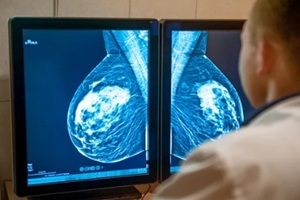 The possibility of a breast cancer diagnosis can be overwhelming and bring a wave of uncertainty about what the future might hold. You may wonder: Am I at risk? Should I get a breast cancer screening earlier? These are not easy questions, but they are important ones. The good news is that early detection saves lives, and knowing your personal risk can empower you to take control of your health.
The possibility of a breast cancer diagnosis can be overwhelming and bring a wave of uncertainty about what the future might hold. You may wonder: Am I at risk? Should I get a breast cancer screening earlier? These are not easy questions, but they are important ones. The good news is that early detection saves lives, and knowing your personal risk can empower you to take control of your health.
Some women face a higher risk of breast cancer due to factors such as family history, genetics, certain health conditions, and lifestyle choices. Determining your personal risk level starts with knowing these factors and talking to your healthcare provider about early screening.
In this blog, we’ll help you make informed decisions about your health by looking at common risk factors of breast cancer, how to determine your personal risk, and what steps to take if you’re considered high risk.
Common Risk Factors of Breast Cancer
Aside from skin cancers, breast cancer is the most common form of cancer in women, accounting for approximately 30% of all new female cancers annually. While all women should be mindful of their breast health, some face a higher risk often due to factors beyond their control. Recognizing these risk factors is the first step in determining whether early screening may be necessary.
Risk factors include:
- Family History of Breast Cancer – Having a sister, mother, or other close relative with breast cancer can significantly elevate your risk.
- Genetic Mutations – Inherited mutations in genes, such as BRCA1 and BRCA2, can greatly raise your likelihood of developing breast cancer.
- Personal History of Breast Abnormalities – If you’ve been diagnosed with atypical cells or had other non-cancerous breast conditions, your risk may be higher.
- Radiation Exposure at Young Age – Women who received radiation therapy to the chest before age 30 are at an increased risk.
- Lifestyle Factors – Obesity, lack of exercise, excessive alcohol consumption, and smoking can all contribute to a higher breast cancer risk.
- Hormonal Influences – Factors such as early menstruation (before age 12), late menopause (after age 55), hormone replacement therapy, or having children later in life can all increase your risk.
If one or more of these risk factors pertains to you, discuss your concerns with your healthcare provider. They can help assess your individual risk and determine whether earlier screening is right for you.
How to Determine Your Personal Risk
The American Cancer Society recommends that women at average risk for breast cancer get annual mammograms starting at age 40. Women ages 55 and older can choose to get a mammogram every other year or continue with annual mammograms. However, those at higher risk may need earlier or more frequent screenings.
Some proactive steps to take when assessing your risk include:
 1. Speak with Your Healthcare Provider
1. Speak with Your Healthcare Provider
A conversation with your healthcare provider is the best place to start. Your doctor can review your personal and family medical history, discuss any concerns, and help determine whether additional tests or screenings are necessary.
2. Consider Genetic Testing
If you have a strong family history of breast cancer, especially if a close relative was diagnosed at a young age, your healthcare provider may recommend genetic testing. This test looks for mutations in genes, such as BRCA1 and BRCA2, which significantly increase breast cancer risk. Other gene mutations, such as PALB2, CHEK2, and ATM, may also be evaluated.
3. Utilize Breast Cancer Assessment Tools
Healthcare providers often use various methods to estimate a person’s lifetime risk of developing breast cancer, such as The Gail Model, The Tyrer-Cuzick Model, and The Claus Model.
The Genius 3D Mammography is one of the latest advancements in breast cancer screening, offering state-of-the-art technology that provides greater accuracy and detects abnormalities that may go unseen in flat 2D images. The exam finds 20 to 65% more invasive breast cancers than traditional 2D mammograms and reduces unnecessary callbacks by up to 40%.
If your calculated risk of breast cancer is high, your healthcare provider may recommend earlier mammograms, breast ultrasounds, breast MRIs, and/or other preventive strategies.
Steps to Take If You’re Considered High Risk
If you’re at a high risk for breast cancer, taking proactive steps can make a significant difference in early detection and prevention. Work with your healthcare provider to develop a personalized screening plan, which may include earlier or more frequent imaging.
Additionally, adopting a healthy lifestyle, such as eating healthy, staying physically active, limiting alcohol consumption, and avoiding smoking, can help lower your risk. For those at very high risk, preventative options such as risk-reducing medications (e.g. tamoxifen) or preventive surgery (e.g. mastectomy) may be considered. Knowing your options can help you make an informed decision and take control of your health.
Trust Raleigh Gynecology & Wellness for Your Breast Cancer Screening
 The prospect of a breast cancer diagnosis can be frightening, especially if you’re at high risk. Fortunately, knowledge is power, and early detection can save lives. If you’re at high risk of breast cancer, our team’s long-standing experience and expertise is here to support you with compassionate, patient-centered and evidence-based care.
The prospect of a breast cancer diagnosis can be frightening, especially if you’re at high risk. Fortunately, knowledge is power, and early detection can save lives. If you’re at high risk of breast cancer, our team’s long-standing experience and expertise is here to support you with compassionate, patient-centered and evidence-based care.
Our all-women team understands the importance of privacy in gynecological care, and we are here to listen and help address your individual needs at any stage of life. Schedule your breast cancer screening today with Raleigh Gynecology & Wellness for peace of mind.
